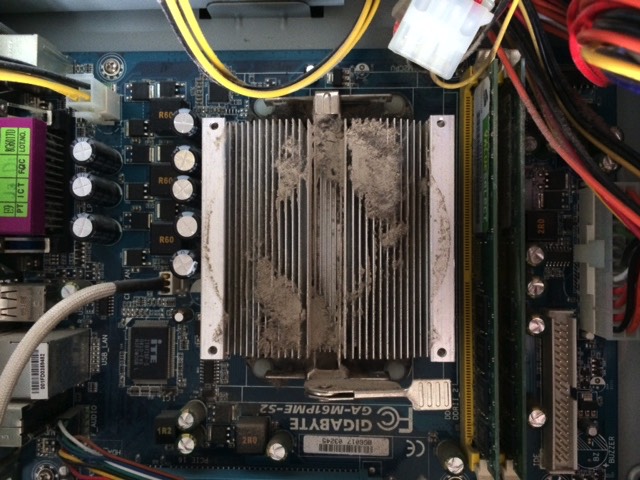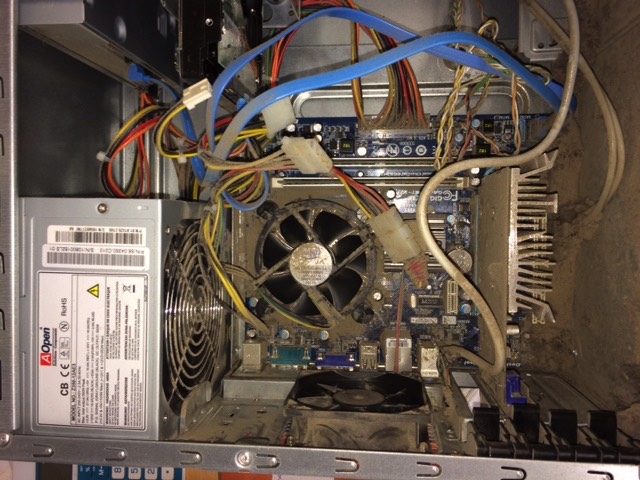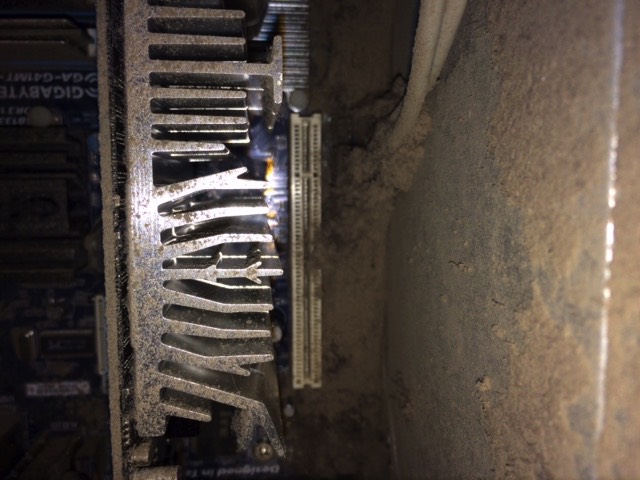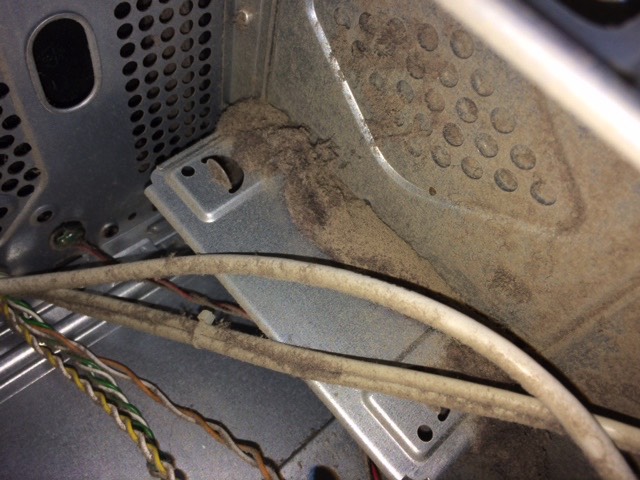Heat - The Electronics Killer

0 ratings
You may not know it but heat is one of the biggest causes of premature failures in electronic devices. This applies to all electronic devices and not just your computer so your smartphone, SatNav and even your television will have their life shortened by high temperatures. Heat has a direct impact on the life of the silicon integrated circuits (silicon chips) built into the electronic devices we all use. The trouble is that heat also has a direct impact on the life of many other components that are built into the same technology.
Computers, smartphones, SatNav's and all other electronic devices will use many different components including a rather humble component called a capacitor or condenser. As an example an electrolytic capacitor may have a predicted life of 80,000 hours when the ambient temperature stays below 30 degrees Centigrade (30C). Increase the ambient temperature to 40C and the predicted life will halve to about 40,000 hours, or about 5 years. At 60C its life expectancy will have reduced to around 10,000 hours, or about 417 days. At 85C the capacitor will only last about 2,000 hours, about 84 days, before failing.
If you want your computers and other electronic devices to be reliable and long lasting you need to keep them cool and not operate or store them in high ambient temperatures. Leaving a laptop, smartphone or other electronic device inside a car on a hot day is definitely not a clever thing to do. Neither should you leave electronic devices in direct sunlight as this can increase their temperature significantly.
Computers pose a special problem because they can run hot even at modest ambient temperatures. It is why almost all computers are fitted with at least one fan and often more than one. As I write this text I can hear the fan that is trying to cool my Central Processing Unit (CPU) as it's working hard due to the high ambient temperature. The temperature inside my computers case is going to be quite a lot higher than the room temperature because of the heat being given off by all the electronics.
Some components run especially hot and this will include the CPU and often the Graphics Processing Unit (GPU) so they will be fitted with heatsinks designed to dissipate the heat as efficiently as possible. Without the heatsinks, and usually the fans to cool them, the CPU's and GPU's would fail due to the high temperatures they would quickly reach when working.
However, there is a problem with heatsinks, and especially those with fans, and its caused by the build up of dust. A heatsink can only operate effectively if it is clean. If it is clogged up with dust then it will not be able to operate efficiently no matter how hard any fan blows on it. This means that the silicon chip it is meant to protect will be running at a much higher temperature and that will shorten its life.
Take a look at the following pictures to see some examples of machines I have worked on. It should be obvious that those machines would have been running at higher than expected temperatures simply because they were so full of dust. That means they could have premature failures simply because they were not kept clean. The chances of a failure would of course increase significantly during a heatwave with machines this dirty.
Computers, smartphones, SatNav's and all other electronic devices will use many different components including a rather humble component called a capacitor or condenser. As an example an electrolytic capacitor may have a predicted life of 80,000 hours when the ambient temperature stays below 30 degrees Centigrade (30C). Increase the ambient temperature to 40C and the predicted life will halve to about 40,000 hours, or about 5 years. At 60C its life expectancy will have reduced to around 10,000 hours, or about 417 days. At 85C the capacitor will only last about 2,000 hours, about 84 days, before failing.
If you want your computers and other electronic devices to be reliable and long lasting you need to keep them cool and not operate or store them in high ambient temperatures. Leaving a laptop, smartphone or other electronic device inside a car on a hot day is definitely not a clever thing to do. Neither should you leave electronic devices in direct sunlight as this can increase their temperature significantly.
Computers pose a special problem because they can run hot even at modest ambient temperatures. It is why almost all computers are fitted with at least one fan and often more than one. As I write this text I can hear the fan that is trying to cool my Central Processing Unit (CPU) as it's working hard due to the high ambient temperature. The temperature inside my computers case is going to be quite a lot higher than the room temperature because of the heat being given off by all the electronics.
Some components run especially hot and this will include the CPU and often the Graphics Processing Unit (GPU) so they will be fitted with heatsinks designed to dissipate the heat as efficiently as possible. Without the heatsinks, and usually the fans to cool them, the CPU's and GPU's would fail due to the high temperatures they would quickly reach when working.
However, there is a problem with heatsinks, and especially those with fans, and its caused by the build up of dust. A heatsink can only operate effectively if it is clean. If it is clogged up with dust then it will not be able to operate efficiently no matter how hard any fan blows on it. This means that the silicon chip it is meant to protect will be running at a much higher temperature and that will shorten its life.
Take a look at the following pictures to see some examples of machines I have worked on. It should be obvious that those machines would have been running at higher than expected temperatures simply because they were so full of dust. That means they could have premature failures simply because they were not kept clean. The chances of a failure would of course increase significantly during a heatwave with machines this dirty.
keeping your computers clean, especially during hot spells of weather, will help to keep them reliable for longer. Keeping the outside vents clean and clear of dust is quite easy and is something you should do on a regular basis. In homes and offices I would recommend that the inside of any computer is checked about once every two years and more frequently in dusty or dirty environments. Tower style computers kept on floors are also prone to a faster build-up of dust internally and will require more frequent checking and cleaning.
Avoid leaving any electronic devices inside vehicles on warm or hot days as the temperatures inside a vehicle can become very high and this will shorten their life. Also avoid leaving electronic equipment of any kind in direct sunlight or close to any heat source. Try to avoid using your electronic devices above 30C and definitely do not store or operate them above 40C as this can have a big impact on their reliability and expected life span.
Think of it like this. You and me don't like to do work in high temperatures and especially those above 30C. Nor does your computer, smartphone, digital camera, laptop, tablet or other electronic device. You would not wear a coat during a heatwave and a thick coating of dust on a silicon chip or heatsink is just like a winter coat.
Treat them the same way you treat yourself during hot weather and you will be rewarded with devices that last longer, are more reliable and cost effective.
Avoid leaving any electronic devices inside vehicles on warm or hot days as the temperatures inside a vehicle can become very high and this will shorten their life. Also avoid leaving electronic equipment of any kind in direct sunlight or close to any heat source. Try to avoid using your electronic devices above 30C and definitely do not store or operate them above 40C as this can have a big impact on their reliability and expected life span.
Think of it like this. You and me don't like to do work in high temperatures and especially those above 30C. Nor does your computer, smartphone, digital camera, laptop, tablet or other electronic device. You would not wear a coat during a heatwave and a thick coating of dust on a silicon chip or heatsink is just like a winter coat.
Treat them the same way you treat yourself during hot weather and you will be rewarded with devices that last longer, are more reliable and cost effective.



